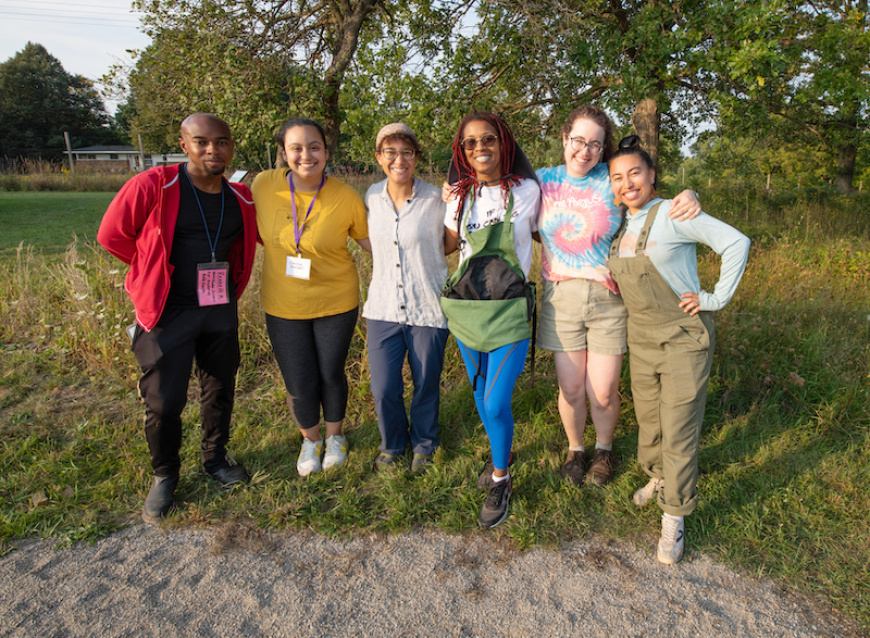
 back to all news
back to all news
Fellowship provides students with learning and training to transform food systems

The Transformative Food Systems (TFS) Fellowship at the University of Michigan (U-M) was created to attract student leaders who reflect the communities that are most affected by the interrelated environmental, health and economic food systems crises. The two-year program provides selected fellows with the learning and training needed to enable them to transform food systems to be equitable, healthy, and ecologically sound.
A collaboration between the Sustainable Food Systems Initiative, the School for Environment and Sustainability (SEAS), Urban and Regional Planning Program (URP) and the Nutritional Sciences Department in the School of Public Health (SPH), with funding from the USDA National Needs Fellowship Program and Rackham Graduate School, fellows gain access to mentorship, courses, social events, and a field experience. Throughout the fellowship, students are encouraged to actively engage in collaboration and systems-thinking (making sense of the complexity of the world by looking at it as a whole rather than by splitting it down into its parts), and to sharpen their leadership, writing and strategic communication skills.
The inaugural cohort, a group of six fellows, is wrapping up their first semester in the TFS Fellowship. We checked in with a few of them to learn about their work thus far.
Carlina Arango, a student at SEAS and URP, has always been fascinated by the role of food in her family’s stories and traditions. As an undergraduate, Arango majored in anthropology and Spanish with a concentration in environmental studies at Grinnell College. We asked her what some of the overarching themes have been in her studies thus far, and if anything has been surprising. She says for her, it has been especially eye-opening to learn how important it is to consider relationships, kinship, arts and healing when exploring what it means to transform food systems. “Although I had an inkling of this before coming to U-M, it strikes me how it's essential to look beyond the physical science components when talking about transforming food systems. Of course, those are also important, but what we need to include a lot of times when envisioning future solutions is the human element, the community involvement, and the conscientization required to move away from our current corporate and industrial agriculture status quo,” says Arango.
We also heard from L’Oreal Hawkes-Willams, a SEAS student who earned an undergraduate degree in ecology and African-American studies at U-M. She took an interest in food systems when she learned about a spinach recall that affected 11 states. It surprised her that so many states could source their produce from one place, resulting in one incident affecting so many people. Hawkes-Willams wants to make a lasting impact on food systems by empowering communities with the knowledge needed to restore their environments while enabling them to grow organic, nutrient-dense foods. “After I graduate, I hope to make an impact by continuing to teach those who may not have access to sustainable food and climate-related programming by helping them understand how to make real-life changes that can lead to a more sustainable lifestyle,” says Hawkes-Willams.
Lunia Oriol, a URP student who received her undergraduate degree in climate and meteorology from U-M, says that she realized the need for leaders in the field of food systems after being involved with the Sustainable Food Program and Campus Farm as an undergrad. “The climate crisis has not only created new problems in the food system, but it has also gradually been exposing ongoing issues (e.g., consolidation of power, colonization of food) in our current food system,” says Oriol. “Climate change is a catalyst for my generation and those after us to redesign the processes and institutions at play in the food system.”
The TFS Fellowship is currently accepting applications for the second cohort, beginning in fall 2023. Interested students are invited to apply to become part of this unique interdisciplinary learning community. To be considered, interested prospective students must first apply to SEAS, URP, or SPH by January 15, 2023. The TFS Fellowship application is due January 31, 2023. Learn more here.

